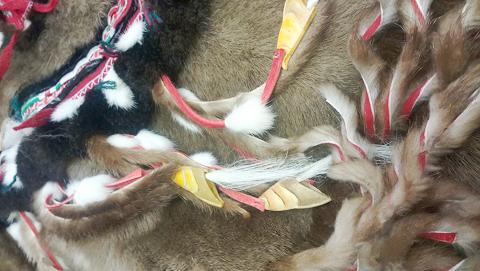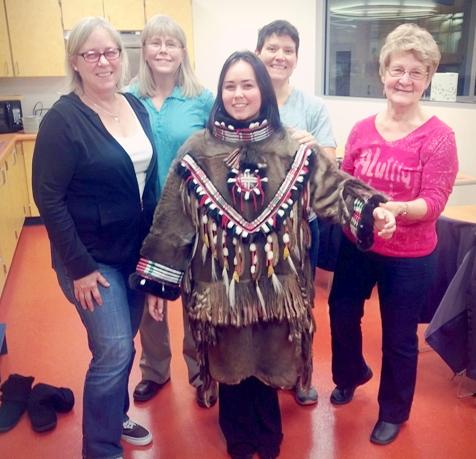 |
Canku Ota
|
 |
|
(Many Paths)
|
||
|
An Online Newsletter
Celebrating Native America
|
||
|
November 2015 - Volume
13 Number 11
|
||
|
|
||
|
Puffin Beaks Replicated
For Alaska Native Parka
|
||
|
by Brian Fraley - Alutiiq
Museum
|
||
|
credits: photos courtesy
of Alutiiq Museum
|
A twenty-first century technology has helped a group of skin sewers achieve a dream, the creation of a traditionally styled caribou-skin parka. A team of seamstresses supported by Kodiak’s Alutiiq Museum spent the past two years developing this garment. Their aim was to revitalize ancestral sewing arts while creating a parka for their tribal cultural center. The final step was to add decorative elements. Inspired the intricate handwork of an ancestral parka, they appliquéd, embroidered, fringed, and tasseled the modern garment, but they were not able to add puffin beaks. Puffins, chubby seabirds with large colorful beaks, are common residents of the Kodiak Archipelago. For millennia, Kodiak’s Native residents harvested these birds for food and material. Puffin beaks were commonly suspended from Alutiiq clothing for decoration and to honor the close ties between people and birds. Today, however, the Migratory Bird Act of 1918 protects puffins and their parts.
To complete their vision, the sewers turned to three-dimensional
printing. Master skin sewer and group leader Susan Malutin worked
with Kodiak High School technology teacher Barry Altenhof to create
a set of faux beaks. Using an image of a beak and ABS plastic, three-dimensional
printers built twenty-four replicas for use on the parka. Three
volunteers then painted the beaks, which have been tied to the elaborate,
hand-stitched garment. The result is a masterpiece of modern skin
sewing and a fusion of ancient and modern technologies. Production of the caribou skin garment was supported by a grant from the Institute for Museum and Library Services, and contributions from the Fulford Family, Kodiak Island Borough School District Enliven Program, Port Lions Tribal Council, Larsen Bay Tribal Council, Kodiak Island Housing Authority, Dr. Gordon Pullar, Native Village of Afognak, and the Alutiiq Heritage Foundation. The Alutiiq Museum is a non-profit organization dedicated to preserving and sharing the cultural traditions of the Alutiiq, an Alaska Native tribal people. Representatives of Kodiak Alutiiq organizations govern the museum with funding from charitable contributions, memberships, grants, contracts, and sales. |
||||
|
|
|
|
||
|
|
||
| Canku Ota is a free Newsletter celebrating Native America, its traditions and accomplishments . We do not provide subscriber or visitor names to anyone. Some articles presented in Canku Ota may contain copyright material. We have received appropriate permissions for republishing any articles. Material appearing here is distributed without profit or monetary gain to those who have expressed an interest. This is in accordance with Title 17 U.S.C. Section 107. | ||
|
Canku Ota is a copyright ©
2000 - 2015 of Vicki Williams Barry and Paul Barry.
|
||
 |
 |
|
|
The "Canku
Ota - A Newsletter Celebrating Native America" web site and
its design is the
|
||
|
Copyright ©
1999 - 2015 of Paul C. Barry.
|
||
|
All Rights Reserved.
|
||

